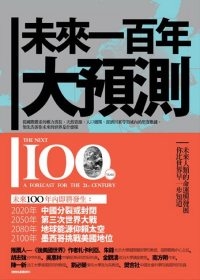- 定價127.00元
-
8
折優惠:HK$101.6

|
|
|
|
未來一百年大預測
|

|

沒有庫存
訂購需時10-14天
|
|
|
|

|
|
9789866488252 | |
|

|
|
吳孟儒、林曉芳、黃思瑜、楊彝安 | |
|

|
|
木馬文化 | |
|

|
|
2009年7月07日
| |
|

|
|
117.00 元
| |
|

|
|
HK$ 99.45
|
|
|
|
|

| |
|
|
|
|
| |
|
|
詳
細
資
料
|
* 叢書系列:不歸類
* 規格:精裝 / 320頁 / 16*22cm / 普級 / 單色印刷 / 初版
* 出版地:台灣
不歸類
|
|
分
類
|
人文史地 > 世界史地 > 通史 |
同
類
書
推
薦
|
|
|
其
他
讀
者
也
買
|
|
|
內
容
簡
介
|
2020年:中國分裂
2050年:第三次世界大戰,美國、土耳其、波蘭、日本這幾個新興強權將發生大戰
2080年:地球能源仰賴太空
2100年:墨西哥挑戰美國強權地位
未來100年當中,
為什麼中國無法成為世界強權?而且即將分裂?
為什麼世界新興強權中,沒有印度?沒有巴西?
為什麼美國仍為世界霸權?
為什麼第三次世界大戰將會發生?
《全球大預測》中,預測了未來一百年人類的命運與發展。
本書讓你比世界早一步知道。
新聞周刊專欄作家兼國際版總編輯,同時也是暢銷書《後美國世界》的作者札卡利亞,推薦本書為每週必讀的書。
本書以非常清楚易懂的文字,預測21世紀全世界可能遭逢的改變。作者本身即是創立美國民營智庫預測機構「戰略預測」(Strategic Forecasting Inc.簡稱Stratfor)的總裁。他解釋了未來在哪裡跟為什麼會爆發戰爭(還有戰爭會怎樣進行)、哪些國家會獲得或喪失經濟與政治上的優勢,以及新的技術與文化潮流將如何改變我們未來的生活方式。
《全球大預測》利用對於過去幾百年來有關歷史及地理政治學的探討,大膽的提出包括人口、經濟、政治面向的分析與預測,包括:
●美國與回教世界的戰爭將結束,取而代之的是,第二次與俄國全面性的冷戰
●中國將會經歷一場重大、長期的內部危機。墨西哥將會崛起,成為世界上重要的強權。
●21世紀中期,將會爆發一次世界大戰,由美國對抗東歐、歐亞大陸與遠東這個令人意想不到的結盟體。不過軍事規模不大,戰爭的傷亡也不大。
●技術的研發將集中在太空,主要用於軍事上還有新能源的開發(主要與環境有關)。
本書特色
喬治.弗列德曼的名言是:「實事求是。不可能的事則免談!」
由他一手創立的智庫「戰略預測公司」(Stratfor),至今仍然是全球首屈一指的未來趨勢、情資分析機構,經常為各國政府、財星雜誌排名前五百大企業提供建議,進行經營環境的局勢解析,提出全球大戰略思考架構下的政策方向。「戰略預測公司」在全球各地與分析家、學界、智庫、各領域頂尖實務人士合作,將蒐羅而來的情報資訊嚴格篩選整理,定期提出完整而周延國際局勢分析。
二十世紀末巴爾幹半島衝突期間,「戰略預測公司」是唯一能夠解析1999年北約空襲科索沃背景、未來衝擊的民間機構,經由《時代雜誌》披露後確立了該公司的權威地位。911事件發生後,該公司更首度對大眾定期提供資訊,預測蓋達組織及布希政府的策略方向。
該智庫也曾經準確預測當今印度、巴基斯坦緊張局勢升高之核心因素,破解出墨西哥毒梟組織的經營結構,並對美國總統歐巴馬的新政府,就眼前即將面臨的挑戰提出精闢建言。因此,「戰略預測公司」在美國又被稱為「影子中情局」或「民間版的中情局」。
作者簡介
喬治.弗列德曼(George Friedman)
生於匈牙利,父母親是二次大戰時納粹大屠殺事件的生還者。由於政治因素,弗列德曼在三歲時隨同父母移居美國。他對政治與國際關係議題特別感興趣,在紐約市立大學主修政治科學,隨後取得康乃爾大學的博士學位,畢業後在賓州的迪金森學院(Dickinson College)任職二十餘年。
除了政治科學學者與作家兩個身份之外,弗列德曼也是美國民營智庫機構「戰略預測」 (Strategic Forecasting Inc.簡稱Stratfor)的創辦人與總裁,此機構為全球首屈一指的情資收集與預測公司,專門提供企業與各國政府關於全球的政經分析與預測。2001 年Barron’s財經雜誌曾稱它為「影子中央情報局」(the shadow CIA)。弗列德曼經常接受媒體訪問,已出版過四本書,包括最近的《美國的秘密戰爭》。他並常常撰寫有關國家安全、資訊戰、電腦安全以及情資等等專文。他目前住在德州奧斯汀。
|
|
目
錄
|
作者的話
序曲
第一章 美國時代的降臨
第二章 大變動:美國與回教世界的戰爭
第三章 文化戰爭、人口爆炸與電腦
第四章 新的斷層線
第五章 2020年:中國——紙老虎
第六章 2020年:俄羅斯——重整
第七章 2030年:美國強權與危機
第八章 混亂失序的時期
第九章 2040年代——戰爭序幕
第十章 戰爭計畫
第十一章 世界大戰:綱要
第十二章 2060年代:黃金的十年
第十三章 2080年:美國、墨西哥互爭世界核心地位
結語
|
|
序
|
未來一百年大預測 繁體中文版作者自序
親愛的台灣讀者:
《未來一百年大預測》這本書,是從整體的角度,探討未來的國際體系之變化。為了協助讀者理解這本書,我採用了地緣政治的觀點。地緣政治這個領域裡面認為,過去幾個世紀以來國際體系的基礎是民族國家,而且在二十一世紀的世界裡,國際的運作也仍然建立在民族國家這個基礎上,因為當代社會具有高度的複雜性,需要有龐大完備的組織才能因應。相形之下,比較小的組織既無法提供一個國家內部經濟上的繁複需求,也不能滿足任合安全上的考量。
我的這種講法,會和那些主張「文化、意識形態才具有關鍵地位」的人士相互衝突。舉例來說,如果我們審視俄國這個國家,它目前的這種狀態,是從十八世紀以來漸漸形成的。雖然它經歷過好幾次劇烈的意識形態上的轉變,但它在國際體系當中的行為模式卻可說是相當一貫。很有趣的是,史達林的外交政策其實和帝俄沙皇的外交政策並沒有太大差異,而且史達林自己也清楚明白這點。史達林在外交政策上重視的是執行面,而不是意識形態面。所以他先和希特勒結盟,後來又靠攏美國,接著在東部歐洲扶植好幾個國家當成緩衝國,以便保護蘇聯。最有趣的是,雖然蘇聯和中華人民共和國之間擁有同樣的意識形態,但這兩個國家後來竟然會產生嚴重的敵對衝突。從這些林林總總的例子可以證明,意識形態無法周延地解釋一個國家的行為。
杭廷頓教授(Samuel P. Huntington)曾經在《外交事務》季刊中撰文,提出「文明的衝突」之觀點。他的見解,我並不同意。首先,不同的文明之間會產生大量的衝突,例如在回教世界裡面,不同的宗教派系、種族、國家經常產生衝突,而整個回教世界就是由這些衝突所構成的。其他的文明,舉例來講美國好了,可能會和回教世界裡面的單一成份產生衝突,可是更重要的是要仔細觀察美國如何利用回教世界內部的矛盾分裂,來達成美國自己的目標。不管是沙烏地阿拉伯和埃及,或是其他非回教的國家,統統密切觀察著美國的動向。這個世界裡充滿了分裂的派系,遠比文化╱文明衝突理論所描寫的更複雜。
地理位置決定了國力。就算冰島這個國家擁有最聰明的領袖,最完備的意識形態,也永遠無法主導、塑造整個國際體系。同理,我認為美國的總統就算再笨,文化就算再墮落,但光憑著美國在國際體系當中的重要份量,就可以使美國持續位居決定性的地位。對我來講,我看重的是一個民族國家內部的基本要素,而不是意識形態或者文化的自我感覺;我也認為優良的領導人沒那麼重要。(雖然,不可諱言的是,意識形態、文明、領袖人物多少會產生一些影響力)
在這個地球上,並不是只有美國一個國家存在而已。其他很多國家為了自身的利益,都會想盡辦法對抗美國。我認為近期的未來,以下三個國家最值得觀察:日本、土耳其、波蘭。或許有些人會看好其他的國家,但我自己則不這麼認為。以印度為例,印度幅員廣大,卻有兩大先天缺陷。第一大缺陷是印度內部有許多分立的小國存在,中央政府始終沒辦法有效處理這麼多複雜多變、效率低落的地方政府,導致印度內部的發展非常不均衡,有的地區興盛,有的地區停滯。世人對印度有期望,不過恐怕印度是達不到的。第二,印度的地理封閉,北有喜馬拉雅山,東邊是一片叢林,無法通行。西邊是充滿敵意的巴基斯坦。印度通往世界的唯一門戶,是經過海洋往外走。問題是,全球的海洋都被美國人所控制把持。為了要保持對外交通的暢通,印度別無選擇,只能和美國緊密結盟,如此一來又限制了它自己的空間。
另一個被大家看好的國家是巴西,充滿機會的國度。可是巴西也是個孤立的國家。只要拿出地圖來看,就會發現它在拉丁美洲這一塊裡面孤立無援。再從全球的觀點來觀察巴西,就會發現它所在的位置完全不具有任合戰略重要性。當然,它也可以當一個「地理上孤立而不具地緣政治重要性、但是經濟相當繁榮」的國家。可是一個國家的國力包含了軍事力和經濟力,而軍事和經濟兩者都和地理位置緊密相關。到頭來,巴西或許可以成為經濟大國,但它依舊無法主導國際體系。
在這樣的情況下,台灣也必須好好考慮自己的處境。台灣的面積不大,可是經濟上卻有著超高的效率。像台灣這樣的國家,最好是能夠位在一個不錯的地理位置,才方便保護自己。因此,台灣身為一個島國,就非常幸運了,因為中國無法入侵台灣。中國的陸軍固然規模龐大,但它的海軍不夠強,所以沒辦法對台灣發動兩棲攻擊,就算發動攻擊也沒辦法長期維持它部隊的補給線。
要打台灣的話,中國還有其他辦法,例如採用潛艇封鎖、發射飛彈等。如果台灣單靠自己的力量,絕對無法抵擋這種威脅,因此台灣必須尋找一個海上強權國家,並且和這個強權國家維持緊密的戰略伙伴關係。此時台灣的結盟伙伴是美國,雙方的關係也是台灣的國家安全基石。台美的結盟,加上台灣本身島國的地理位置,就足夠解決國防安全上的問題了。
當然,台美的結盟關係當中還有另一個問題,那就是美國是否願意繼續挺台灣。美國是否挺台灣的關鍵,並不在於中國(中國只是表面上看起來很可怕而已)。亞洲有另一個海上強權國家,那就是日本。日本擁有足夠的船艦可以培育出大量海事專家,歷史上也曾經是個海上強權,而中國則不具備這些條件。在經濟上,日本是僅次於美國的世界第二大經濟體,經濟規模遠大於中國。雖然日本目前的經濟發展很慢,也沒賺得太大利潤,但它的龐大規模還是不可忽略。
此刻的日本,在國際體系中維持著相當低調的角色,幾乎看不到它在國際事務上做了什麼事。可是日本不會永遠這麼低調下去。台灣是個島國,日本是個龐大的區域性海上強權,對台灣來講,下幾代台灣人一定會發現,台灣與日本的關係需要重新界定,而且這件事還很重要。我認為未來的日本會再度興起,而且美國會想辦法壓制日本。在美日的衝突中,台灣站在不錯的立足點上,可以在這兩個相互衝突的大國當中選邊站。我高度期盼台灣能夠持續選擇美國這一邊。
美國的國力無與倫比,其他國家的力量也很大,但這並不意味著世上剩下的國家就沒有安全和繁榮可言了。歷史上,大國始終存在,比較小的國家也始終能在權力競逐的當中找出活路。台灣也必須這樣,而且台灣過去半個世紀以來的表現不錯,看起來台灣未來仍然可以繼續維持繁榮。
喬治.弗列德曼
二??九年六月十一日
Preface for Taiwan edition of The Next 100 Years
The Next 100 Years is a book about the future of the international system as a whole. The method it uses for understanding that system is geopolitics. Geopolitics argues that the national or multi-national state, which has been the foundation of the international system for several centuries, will continue to be the foundation in the 21st century. The complexity of modern societies requires larger units of organization. Extremely small systems cannot provide the complex internal services required by a modern economy from the state, nor can they provide for any degree of security.
This view disagrees with those who regard culture or ideology as decisive. When we look at the history of Russia since it achieved its general modern form in the 18th century, we find that its behavior in the international system had a great deal of continuity in spite of dramatic changes in ideology. It is interesting to note that Stalin’s foreign policy was not markedly different from Czarist foreign policies. Indeed, this was something Stalin was quite aware of, inasmuch as he focused on the geopolitical in executing foreign policy, rather than on ideology. He allied with Hitler, then with the United States, and created a buffer of states in Eastern Europe to protect the Soviet Union. It is particularly interesting to note that the Soviet Union and the People’s Republic of China developed extremely hostile relations with each other in spite of sharing a single ideology. From this and other examples, it would seem that ideology does not explain the behavior of nations very well.
Samuel P. Huntington has written on the clash of civilizations. His point of view is not one I agree with. First, there is tremendous conflict within civilizations. In dealing with the Islamic world, for example, there are conflicts between religious factions, ethnic groups and nation states. These conflicts define the Islamic world. Other civilizations, such as the United States, might clash with elements of the Islamic world, but it is important to see how the United States uses the divisions inside the Islamic world to achieve its ends. States such as Egypt and Saudi Arabia, both extremely important nations, are as interested in the success of the United States as are non-Islamic countries. The world is much more fractious than theories about culture and civilizational clashes account for.
Geography determines power. Iceland can have the most brilliant leader and the finest ideology, but it can never shape the international system. Similarly, I argue that the United States could have the worst leader and the most corrupt culture, and its sheer weight in the international system would make it a defining power. The fundamentals of the nation-state are more important to me than the self-perceptions of ideology and culture, or excellence in leadership, although all may have an effect.
Obviously, the United States is not alone in the world and other countries will try to contain its power in order to protect their interests. Three countries are of immediate importance: Japan, Turkey and Poland. There are countries that others find important that I do not. One example is India. India is a very large country but it has two weakness. First, it is a multi-national state in which the central government has not been able to overcome the diversity and inefficiencies of many of its state governments. Thus, India suffers from very uneven internal development in which some regions surge and other regions stagnate. This will cause India to disappoint expectations. Second, India is geographically isolated. The Himalayas in the north and the jungles to the east block easy access in those directions. A hostile Pakistan blocks it from the west. India’s only path to the world is through the sea, and that sea is controlled by the United States. It must align itself with the United States in order to maintain access, which limits its room for maneuver.
Brazil is also mentioned frequently, and that is a country with tremendous opportunity. But Brazil is an isolated country. If you look at the map in the book, you will see that it is isolated in Latin American itself. On a global basis it is located at a non-strategic point. It is certainly possible to be a prosperous economic power and lack geopolitical weight because of geography. Power is military as well as economic and both depend on geographical position. Brazil will be a great economic power but it will not shape the global system.
It is in this context that Taiwan must consider its position. It is a small country but disproportionately effective economically. A country like Taiwan requires a geographical position that protects it from threats. As an island, Taiwan is enormously fortunate. This is particularly true because the PRC cannot threaten Taiwan with attack. The PRC has a powerful Army but a weak Navy. Its ability to execute an amphibious attack and maintain logistical support to those forces over time is extremely limited.
The PRC could strike in other ways, trying to isolate Taiwan through submarines and missiles. Taiwan by itself cannot deal with this threat. Therefore, Taiwan will always require a strategic partnership with a major maritime power. At this point, that power is the United States, and this is the foundation of Taiwanese national security, which when coupled with Taiwan’s geographical position, solves the problem.
Of course, the question will be whether the United States will wish to remain in this relationship to Taiwan. The real question here is not the PRC, which appears more threatening than it is. The great Asian naval power is, of course, Japan having both ships and the tradition needed to create naval officers—which the PRC lacks. Japan is also a much greater economic power than the PRC, being second only to the United States. Japan is not currently growing economically, but growth is not always profitable, and its size is already massive.
Right now, Japan takes a modest, almost invisible role in the international system. This is not a permanent situation. Taiwan is an island. Japan is a powerful regional maritime power. For Taiwan, over the coming generations, defining its relationship with Japan will be critical. I argue that the emergent Japan will be challenged by the United States. In that case, Taiwan will have an advantageous position, in being able to choose between rivals. I strongly expect Taiwan to continue its relationship with the United States.
The power of the United States and of the second tier countries does not exclude safety and prosperity for other countries. There have always been great powers and other nations made their way within the matrix of power they created. This is what Taiwan will have to do, and it has done it with great success for over half a century. There is no reason why it will not continue to do so.
|
|
內
容
試
閱
|
* 讀者評鑑等級:
3顆星
* 推薦人數:1,共有1位網友寫書評。
*
我要寫書評
1.
包淳亮
/ 台灣台北
2009.08.20看包淳亮的所有評論
評鑑等級:
3顆星
這本書英文版也才在美國上市不久,台灣的翻譯速度很快,值得慶賀。
不過這本書的英文版在亞馬遜書店也得到許多譏評,給星也就三顆四顆為主,本人也只願給三顆。四顆可以考慮,但有點勉強。為什麼?大家看看書摘提到的那些想定,也會感到他確實有點太會扯了。
然而,其中確實還是有些可以推敲的觀點。例如他用「島國」來形容中國的地緣環境,就讓人覺得頗有意思;作者特別畫了個圖,把廣大高山沙漠無人區視同海洋,確實就讓人對中國的地緣政治環境有了不同的想像。再例如書中提到廿一世紀末之前美國與墨西哥可能一戰,也不是沒人注意到其中仍有一些道理。今天 (19日)晚上(台北20日晨)在洛杉磯Hammer Museum一場論壇,來自墨西哥的演講者還提到本書,不過他覺得墨西哥人早就被美國嚇破膽了,大概不會想跟美國打仗。有趣的回應。但是墨西哥裔在美國南部日益增加,許多地區已採雙語並重,已故的美國政治學者杭亭頓在「我們是誰?」一書對此就有頗多著「墨」,擔心美國的國家性質會被改變。可見未雨綢繆的,還不止佛列德曼一人。
基於上述,筆者認為本書買來看看仍然不失為一個打發時間的選擇,她還不至於糟到讓人不屑一顧的程度。
|
|
|
書
評
|
|
|
|
|

